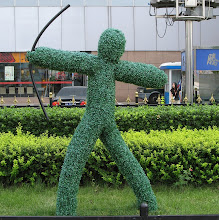
Myers-Briggs personality type theory describes sixteen personality types using four dichotomies: Sensing(S)/iNtuition(N), Thinking(T)/Feeling(F), Extraversion(E)/Introversion(I), and Perceiving(P)/Judging(J). The FIRST four of the eight characteristics are based on the seemingly self-evident difference of how human mind functions, and each person has one, and one only, dominant process and one auxiliary process among these four characteristics, namely S, N, T and F.
The first dichotomy Sensing/iNtuition is about the preferred way one's mind gathers information. S type person prefers gathering information directly through five senses: Smelling, seeing, tasting, hearing, and touching. On the other hand, N type person prefers gathering information through “indirect perception by way of the unconscious, incorporating ideas or associations that the unconscious tacks on to perceptions coming from outside”. This fundamental difference in the preferred way of gathering information, or in perceiving, creates a basic easily observable difference: S type person favors actuality, facts, and present, whereas N type person favors possibility, abstracts, and future.
The second dichotomy Thinking/Feeling is about the preferred way one's mind makes decisions. Thinking type (T type) person prefers arriving at conclusion through objective, impersonal, logic means, whereas feeling type (F type) person prefers personal and subjective approaches. Myerses put the difference between T and F types in an ingenious way: “a reader who considers first whether they (the theory) are consistent and logical is using thinking judgment. A reader who is conscious first that the ideas are pleasing or displeasing, supporting or threatening ideas already prized, is using feeling judgment”. Ordinary people do use both way of judging, but each of us PREFERS one of them to the other.
The third dichotomy Extraversion/Introversion describes whether the person focuses on external world of people and things or internal world of concepts and ideas. Normal people deal with both external and internal world, but only one is their focus. And the final dichotomy Perceiving/Judging is about preferred way one deals with the outside world. People have to use both perception (S and N) and judgment (T and F) to deal with the outer world, but cannot use both at the same time. Those who are more curious are usually more comfortable with perception attitude, whereas those who are more decisive are usually more at home with judgment attitude.
Out of the four basic functions of mind (S, N, T and F), only one is dominant for each person. The dominance is developed through exercising the favored function from the moment of birth. Because the use of one function requires the shut-down of all the other processes, the dominant function develops at the expenses of the other function. However, one auxiliary process must be developed to give balance in a person’s life. If the dominant process is a judging one, the auxiliary process is a perceptive one, and vice versa. The role of auxiliary process is to provide balance between judgment and perception. If a person doesn’t develop adequately the auxiliary process, their lives are unbalanced. Myers put it this way: “An extreme perceptive with no judgment is all sail and no rudder. An extreme judging type with no perception is all form and no content.”
Up to now, the post has outlined the most salient features of Myers-Briggs personality type theory. However, several interesting but less important aspects of the theory, such as the balance between extraversion and introversion, and the shadowy side, have been omitted to keep the length of this post readable.
The most intriguing aspect about a theory is its application/prediction to real life. And it is what will come next.














